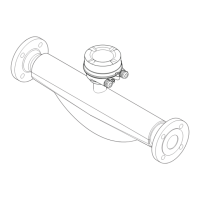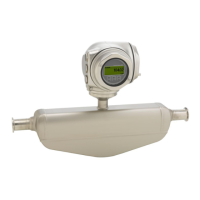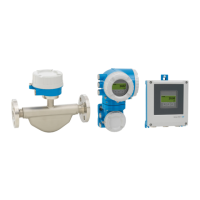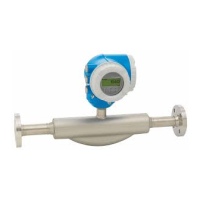Proline Promass I 100
36 Endress+Hauser
DN 1:1 1:10 1:20 1:50 1:100 1:500
[inch] [lb/min] [lb/min] [lb/min] [lb/min] [lb/min] [lb/min]
2 2 573 257.3 128.7 51.46 25.73 5.146
2 FB 6 615 661.5 330.8 132.3 66.15 13.23
3 6 615 661.5 330.8 132.3 66.15 13.23
FB = Full bore
Accuracy of outputs
o.r. = of reading; o.f.s. = of full scale value
The output accuracy must be factored into the measured error if analog outputs are used, but
can be ignored for fieldbus outputs (e.g. Modbus RS485, EtherNet/IP).
Current output
Accuracy Max. ±0.05 % o.f.s. or ±5 µA
Pulse/frequency output
Accuracy Max. ±50 ppm o.r.
Repeatability
o.r. = of reading; 1 g/cm
3
= 1 kg/l; T = medium temperature
Base repeatability
Mass flow and volume flow (liquids)
±0.05 % o.r.
Mass flow (gases)
±0.25 % o.r.
Design fundamentals (→ 37)
Density (liquids)
±0.00025 g/cm
3
Temperature
±0.25 °C ± 0.0025 · T °C (±0.45 °F±0.0015 · (T–32) °F)
Response time
The response time depends on the configuration (damping).
Influence of ambient
temperature
o.r. = of reading; o.f.s. = of full scale value
Current output
Temperature coefficient Max. ±50 ppm/°C o.f.s. or ±1 µA/°C
Pulse/frequency output
Temperature coefficient Max. ±50 ppm o.r. /100 °C
Influence of medium
temperature
Mass flow and volume flow
When there is a difference between the temperature for zero point adjustment and the process
temperature, the typical measured error of the sensor is ±0.0002 % of the full scale value/°C
(±0.0001 % of the full scale value/°F).
Density
When there is a difference between the density calibration temperature and the process
temperature, the typical measured error of the sensor is ±0.0001 g/cm
3
/°C (±0.00005 g/cm
3
/°F).
Field density calibration is possible.
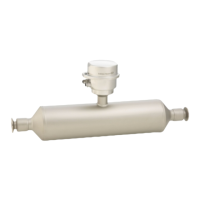
